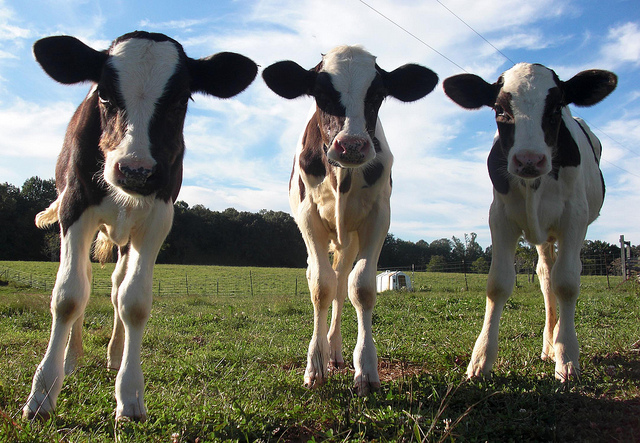I’ve been spending a lot of time thinking about the threats our planet is up against.
Instead of the helpless, overwhelmed surrender I often feel when I read of the perils Earth is facing, I’ve been focusing on actionable ways that I can reduce my own impact.
I traded in my SUV for a hybrid. I compost, bring my own bags to the grocery store, and try to stay away from products with excess packaging.
As I look for more ways to reduce my family’s impact on the earth, there’s one thing that keeps coming up over and over again in my research.
Eating less meat and other animal products is one of the most impactful ways to reduce carbon emissions.
Especially beef.
I’ve been a vegetarian since I was 15—except for a three-month bacon relapse during my son’s infancy. This change began percolating one night when I was eating my mom’s delicious fried chicken and noticed the purple veins hammocked between the bone and the meat. An animal lover, I could no longer distance myself from the fact that the burger, chicken or pork on my plate had once been a living, breathing animal.
I’ve always been a live and let live vegetarian—my choice to stop eating meat was a personal decision, and I never cared if people around me ate meat. My husband eats meat, as do my kids.
But as it turns out, consuming a diet heavy with meat and dairy—and particularly, beef—affects all of us.
While the livestock industry is responsible for about 20 percent of greenhouse gas emissions, cattle account for about 65 percent of those emissions, according to the Food and Agriculture Organization of the United Nations.
Cattle also require 28 times more land than pigs or chicken do.
A recent Swedish study concluded that reducing beef and cow’s milk intake by 50 percent would help Europe meet their climate-related goals.
While eating less meat lowers carbon footprint, it also is better for health.
A new study examined human mortality rates, the environment, and healthcare costs by comparing a variety of dietary scenarios. “Transitioning toward more plant-based diets…could reduce global mortality by 6–10 percent and food-related greenhouse gas emissions by 29–70 percent, compared with a reference scenario in 2050,” the study concluded.
If the above reasons aren’t enough to reconsider our relationship with meat, it’s expected that as the world population climbs, we may not have the resources to feed more people unless we rethink our diets. A paper by the World Resources Institute suggests that moving towards diets higher in plant-based protein and lower in meat (and specifically beef) could go a long way towards closing the anticipated food gap.
The abundance of research on the environmental impact of eating meat has me re-examining my kids’ diets. Transitioning to a diet less reliant on animal products may not be easy for some, but the benefits to the earth and human health seem well worth the sacrifice.
Author: Lynn Shattuck
Editor: Renée Picard
Image: Rikkie’s Refuge at Flickr







Read 1 comment and reply